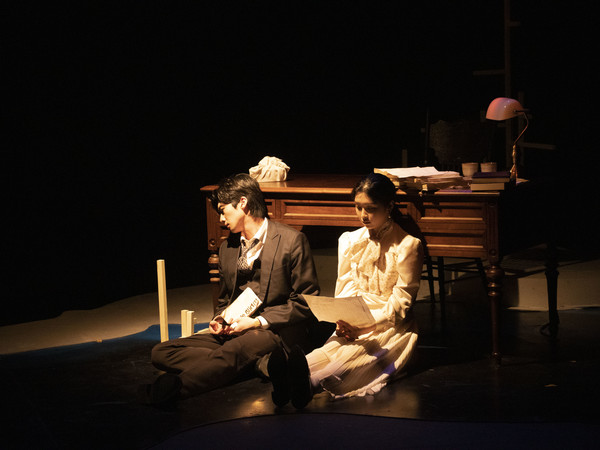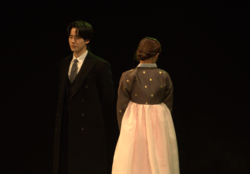
“The life running in vast a wild field / where are you heading? / In the lonely world, rough confession / what are you looking for?” A young woman’s sad voice fills the air of the theater. Her voice and song, which seems sorrowful yet calm, deeply penetrate and settle in the hearts of the audience, who are holding their breath. The song is “Hymn of Death’” by Yun Shim-deok, a singer who disappeared with her lover during the Japanese colonial period. Why did she disappear from this world after leaving behind such a song praising death? The School of Performing Arts and Media, College of Arts, Chung-Ang University, revives the love story of two artists who were trapped in time, hidden deeply into the sea, through the play ‘The Hymn of Death’ in a quiet stillness.
Characters
Kim Woo-jin: A playwright and theater theorist during the Japanese colonial period. He feels frustrated by his conservative household. He later falls in love with Yun Sim-deok, a soprano singer.
Yun Sim-deok: A soprano singer and actor during the Japanese colonial period. She is the most famous soprano of Joseon, who meets Kim Woo-jin through Hong Nan-pa and falls in love with him.
Hong Nan-pa: A composer and violinist during the Japanese colonial period. He is a close friend to both Kim Woo-jin and Yun Sim-deok, and introduced the couple to each other.
Jo Myung-hee: A poet, novelist, and playwright during the Japanese colonial period. A close friend of Kim Woo-jin and Yun Sim-deok.
Yosida: A Japanese police officer who investigates Kim Woo-jin and Yun Sim-deok to uncover the truth behind their deaths.
Humiko: A Japanese nurse who was Kim Woo-jin’s girlfriend before Yun Sim-deok.
Synopsis
During the Japanese colonial period in the 1920s, Yun Sim-deok, who was studying abroad in Tokyo, ignited her artistic soul as a vocalist, and at the same time, a genius playwright, Kim Woo-jin, struggled to revive the theater of Joseon. Through Hong Nan-pa, Kim Woo-jin and Yun Sim-deok meet, and they share passionate love moving throughout Japan and Joseon. However, in the face of constant hardships, they eventually make a grave decision for freedom. The story of Kim Woo-jin and Yun Sim-deok creates a big wave not only in Joseon but also in Japan. Eventually, people who want to know what really happened to the two youths who disappeared, and the story of their love is recalled again.
Yun Sim-deok, an Artist Who Had to Sing the ‘Hymn of Death’

The Young men and women in ‘The Hymn of Death’’ are modern boys and modern girls who do not wear only traditional Korean hanbok, but also wear Western-style clothes, hairstyles, and shoes, enjoying modern life. Through studying abroad, they learn the ideologies of unfamiliar philosophers, enjoy free love, and gain open-minded sights. These elements show the audience of hope that bloomed in the gloomy Japanese colonial era. However, an insurmountable wall blocks the way of two young artists. In particular, Yun Sim-deok must have continued to face the limitations imposed on female artists in the Joseon Dynasty during the Japanese colonial era. At that time, unlike the past, words such as “new woman” and “liberalism” were in vogue and Joseon was changing, but young women who sang were still subject to all sorts of cruel scandals. Even though she was the best female soprano in Korea during that time, Yun Sim-deok could not continue doing the music she wanted, and had to endure the pitiful and contemptuous gazes from her peers when she was forced to sing only popular music for living. Even though she was a popular singer, the money she received from her record company was so low that it was impossible to enjoy freedom. In this situation, it can be thought that perhaps the only thing that Yun Shim-deok could do of her own will was to set her heart in the direction of love. Therefore, when such true love continued to slide through her fingers due to various obstacles, she must have had no choice other than to sing praises for death sorrowfully, thinking that death was the only way to escape from all the shackles.
The Moment When a Person Truly Exists as Oneself

One could imagine what would have happened if the two abandoned their love for each other and started anew. In the play, Yun Sim-deok and Kim Woo-jin often break up to find their own selves. Caught in a scandal that tries to destroy her, Yun Sim-deok runs away to China alone and spends years there, establishing a new version of herself. Kim Woo-jin also travels to a faraway place without any contact after he himself feels frustrated and in despair after Yun Sim-deok fails her first acting challenge. After he went alone, he sent a letter saying “I fight to overcome this reality. I fight with the reason for my existence.” This reveals that Kim Woo-jin tried to think about himself in his own silence, away from the loud storm of love. Cho Myung-hee also tells his friend Kim Woo-jin, who is suffering from the conflict between his lover, Yun Sim-deok and his stable but oppressive family, “Love soothes people’s loneliness and makes them forget the pain of life, but love itself is not the meaning of human existence.” However, in the end, Kim Woo-jin and Yun Sim-deok discard all options given to them without each other and choose to be together again. The two could only exist as themselves when they could be together. Even if they exist in the middle of chaos, the two enjoy the fleeting moments of being together as a whole, in the eye of the hurricane.
How many times in our lives will we feel true love? The feeling of love is a strange thing that doesn't know when or how it will come. The two main characters in ‘The Hymn of Death’ realize the clear feeling of love that arrives in front of them during the social background of the Japanese colonial period in Joseon, when free love was not possible for many. However, their love is accompanied by emotions such as fear, despair, and remorse as well as affection, so they had to overcome not only the prison of their social background but also the conflict with their inner selves, and to achieve that, even greater courage must have been needed. In the end, the love between the two could only exist as perfect 'love' when it was placed inside the deep dark sea with no other sounds but the sound of the waves unraveling the countless tangled threads of other emotions.
Place: Chung-Ang University Institute of Performing Arts and Film, Space 1959
Dates: 2023. 02. 24 (Fri) ~ 02. 26 (Sun)
Fri 19:30 / Sat 15:00 ,19:30 / Sun 15:00

